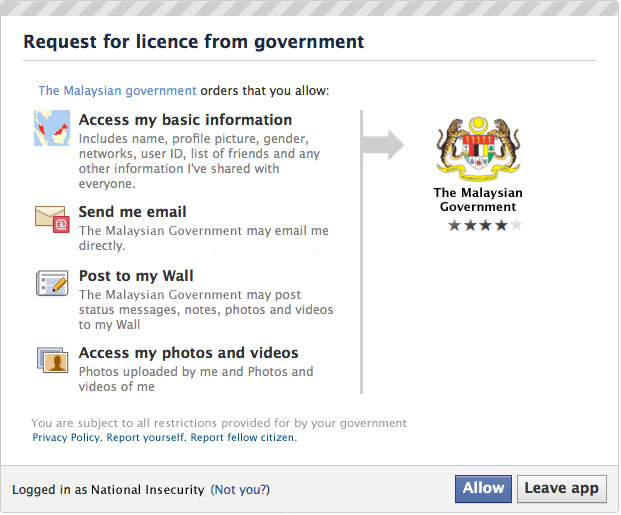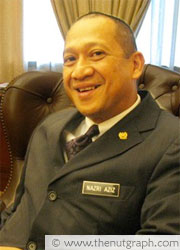CAN the Malaysian government actually be thinking of imposing more controls on our already overly-regulated right to freedom of expression? There’s a myriad of laws available to arrest, charge, fine and jail Malaysians for speaking their minds in ways the government disapproves of.

But apparently, these controls are still not enough. On 24 Jan 2011 Home Ministry secretary-general Mahmood Adam announced the ministry was thinking of including the internet in the Printing Presses and Publications Act 1984 (PPPA). Apparently, there are “loopholes” and the law should be more inclusive. This was in addition to the new “guidelines” that have been drafted to show people how the Sedition Act, amongst others, applies online.
It is certainly ingenious of our government to package the stifling of people’s freedom by calling it a move to “[make] the law inclusive”. It should not take a sceptic to see that the only “loopholes” the Barisan Nasional (BN) government wants to close are those where people can express dissenting views. The only things at stake in BN attempting this further clampdown are its reputation, credibility, and hold on power, and hardly “public order” or “national security”, as they are fond of telling us.
Over-controlled
If one looks at the laws already available, there’s already more than enough for the government to police Malaysians, including online.
The Sedition Act 1948, the Internal Security Act 1960, the Official Secrets Act 1972 and more recently, the Communications and Multimedia Act 1998 (CMA); all give the government great powers to prosecute and jail those whom they perceive as threats. The CMA even makes it a crime to be offensive on the internet with the “intention to annoy”, as unclear as that sounds. Malaysians can be liable for any criticism deemed prejudicial to “public order” or “national security”. These terms are vaguely defined and often selectively interpreted.
The government has already amply demonstrated that it is perfectly capable of prosecuting all manner of internet behavior with available laws. The government has charged individuals not only for articles published online, but also for their Facebook statuses, blog posts and comments. It has investigated online news organisations such as Malaysiakini, even going as far as to raid their office and confiscate their computers and servers. So what “loopholes” was the secretary-general talking about? What more do they want to do that they have not already done?
PPPA’s powers
To have a clue of what the home ministry’s secretary-general had in mind, let’s examine the powers the PPPA confers on the ministry and the home minister. Here’s a brief summary of the key factors in the PPPA that currently apply to the print media.
1. Permit needed
A permit is needed for the publication of any newspaper. The PPPA defines newspapers as any publication containing “news, intelligence, reports of occurrences or any remarks, observations or comments, in relation to such news, intelligence or occurrences.[…]” It also covers reports on “any other matter of public interest”, magazines, comics or any other periodical printed for sale or for free at regular or irregular intervals. The granting of permits is at the “absolute discretion” of the home minister.

If such a definition were to extend to the internet, every blog, Twitter and Facebook account that commented on happenings in Malaysia could potentially fall under the PPPA’s ambit.
What’s unclear, and impractical, would be the mechanics of requiring permit applications by every blogger, and every Twitter and Facebook user.
2. Revocation or suspension
Permits may be revoked or suspended if the home minister is satisfied that a publication or newspaper contains anything prejudicial to “public order” or “national security”.
Exactly what “prejudicial to public order or national security” means is not defined.
3. No court challenge
The home minister’s decision to grant, revoke or suspend a permit is final and cannot be challenged in court.
This violates a basic cornerstone of democracy where there is a separation of powers between the legislature, executive and the judiciary. The judiciary is meant to stand as a bastion against government abuses and hold government ministers to account if they make unreasonable or irrational decisions. The courts, however, lost the power to scrutinise the home minister’s decision in relation to the granting of permits after a 1988 amendment to the PPPA.
4. No right to be heard
And just so we’re absolutely clear that the media has no say whatsoever when it comes to permits, section 13B was added in 1988. The section states: “No person shall be given an opportunity to be heard with regard to his application for a licence or permit or relating to the revocation or suspension of the licence or permit granted to him under this Act.”
This removes an important component of natural justice applied in cases of judicial review where the courts will look closely at whether applicants were heard before adverse decisions were made against them.
Expression and security

When commenting about the new “special guidelines” for the internet, Minister in the Prime Minister’s Department Datuk Seri Nazri Aziz said freedom of speech online could be set aside if the country’s security was at stake. He also said freedom of speech did not mean freedom to lie or slander.
It is arguable, however, that applying the draconian PPPA to the internet and narrowing the already limited spaces for dissent could also, possibly, have a negative impact on a country’s security. Outlets such as the internet provide much needed space for debate, dialogue and discussion. Yes, these debates may at times be uncomfortable and people will disagree. But I would argue that this is preferable to leaving unexpressed and incorrectly held prejudices unchecked to fester, potentially resulting in more extreme reactions.
Instead, the authorities should protect these safe spaces by using existing laws, for example, by taking action under the Penal Code when violence is threatened. They should not resort to over-regulating and introducing laws with such breadth and width that would suppress free speech in general, not to mention the trouble they will have enforcing these broad laws fairly.
People need to be able to express themselves. As overly repressive regimes have often found out, at great cost to themselves and others, a repressed people will eventually find a way to make themselves heard.
It may have seemed far-fetched a while ago to compare Malaysia to relatively undemocratic Egypt. But this is what concerned Twitter users had this to say after the announcement on the proposed PPPA amendments was made. “Would the PPPA amendment turn KL into Cairo?” one user tweeted. “We may be merely ‘amending’ the PPPA, but to me, it’s one step closer to [Egypt],” said another, referring to Egypt‘s internet blackout, following wide-scale protests.
The Home Ministry seems to be laying off on the amendments for now, given Home Minister Datuk Seri Hishammuddin Hussein’s statement that it is still only in the “early stages of discussion”. But one hopes that the government will carefully consider the consequences before putting yet more curbs on the people’s already diminished outlets for expression. ![]()
Ding Jo-Ann believes there are already too many laws suppressing free speech.
[related-posts]


Justin says
A good purging starting from the top at the Prime Minister’s seat would be a start […]
fara says
BN is afraid of information freedom. They realise they no longer can lie or mollycoddle the people given that the internet spreads information faster than conventional media. Regulations such as this are simply an attempt to save their behinds.
mike says
Allow me to do the thinking for them: just use the ‘kill-switch’.
You know, the one Mubarak tried, disconnecting from the internet for the entire country. That way no information can flow in, or out, to spread any disagreements one might have on the BN’s policies. How nice that would be. The PM and his cabinet would then feel ultra secure because now no one can criticise their policies. In fact, come to think of it, why don’t we stop printing newspapers and close down schools – then young people will not learn to read, think or discuss what is good for Malaysia. And since they cannot think critically, the PM and his cabinet, again, will find that extremely useful and they will then govern a bunch of idiots. I wonder why the home minister thinks there is a need to discuss? I’ve just solved their problem. See, so simple.
No wait. Maybe I’m wrong. Maybe the home minister’s idea just might work. Since the US senate (Wikileaks incident) and a 30-year-old regime led by Mubarak (with billions of free funding from the US annually) have tried and FAILED to control information flow via the internet, I think we are in extremely good position to show both the Western world and Middle East how it is done. Malaysia’s solution via an outdated legislation, the PPPA 1984, would absolutely solve the problem. Now why didn’t the US senators and Mubarak’s security-intelligence apparatus think of that? See, so simple.
The world’s best stuck-on-stupid solution.
Anonymous Coward says
Maybe I’m cynical but I feel that it’s just that one step they’re taking to make sure that the mass population don’t think that the Internet is a free-for-all. By doing this, some people might start watching what they say, lest they get brought in for questioning. It probably won’t happen — after all, how can any entity monitor the insane chatter that goes on on the ‘net? — but that twinge of fear from most people might prevent everyone from growing a backbone.
That’s the cynical take.
The not-so-cynical take is that they’ve run out of ideas on how to “protect” their children, i.e. Malaysian citizens.
Politicokat says
Hmmm. Nice. I’d like to see them try.